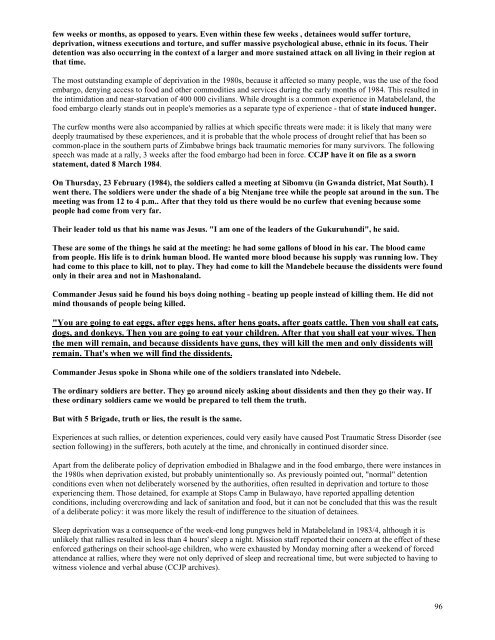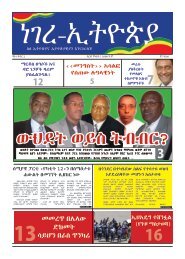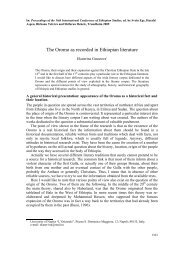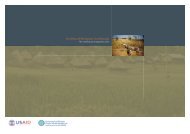MatabelelandReport
MatabelelandReport
MatabelelandReport
You also want an ePaper? Increase the reach of your titles
YUMPU automatically turns print PDFs into web optimized ePapers that Google loves.
few weeks or months, as opposed to years. Even within these few weeks , detainees would suffer torture,<br />
deprivation, witness executions and torture, and suffer massive psychological abuse, ethnic in its focus. Their<br />
detention was also occurring in the context of a larger and more sustained attack on all living in their region at<br />
that time.<br />
The most outstanding example of deprivation in the 1980s, because it affected so many people, was the use of the food<br />
embargo, denying access to food and other commodities and services during the early months of 1984. This resulted in<br />
the intimidation and near-starvation of 400 000 civilians. While drought is a common experience in Matabeleland, the<br />
food embargo clearly stands out in people's memories as a separate type of experience - that of state induced hunger.<br />
The curfew months were also accompanied by rallies at which specific threats were made: it is likely that many were<br />
deeply traumatised by these experiences, and it is probable that the whole process of drought relief that has been so<br />
common-place in the southern parts of Zimbabwe brings back traumatic memories for many survivors. The following<br />
speech was made at a rally, 3 weeks after the food embargo had been in force. CCJP have it on file as a sworn<br />
statement, dated 8 March 1984.<br />
On Thursday, 23 February (1984), the soldiers called a meeting at Sibomvu (in Gwanda district, Mat South). I<br />
went there. The soldiers were under the shade of a big Ntenjane tree while the people sat around in the sun. The<br />
meeting was from 12 to 4 p.m.. After that they told us there would be no curfew that evening because some<br />
people had come from very far.<br />
Their leader told us that his name was Jesus. "I am one of the leaders of the Gukuruhundi", he said.<br />
These are some of the things he said at the meeting: he had some gallons of blood in his car. The blood came<br />
from people. His life is to drink human blood. He wanted more blood because his supply was running low. They<br />
had come to this place to kill, not to play. They had come to kill the Mandebele because the dissidents were found<br />
only in their area and not in Mashonaland.<br />
Commander Jesus said he found his boys doing nothing - beating up people instead of killing them. He did not<br />
mind thousands of people being killed.<br />
"You are going to eat eggs, after eggs hens, after hens goats, after goats cattle. Then you shall eat cats,<br />
dogs, and donkeys. Then you are going to eat your children. After that you shall eat your wives. Then<br />
the men will remain, and because dissidents have guns, they will kill the men and only dissidents will<br />
remain. That's when we will find the dissidents.<br />
Commander Jesus spoke in Shona while one of the soldiers translated into Ndebele.<br />
The ordinary soldiers are better. They go around nicely asking about dissidents and then they go their way. If<br />
these ordinary soldiers came we would be prepared to tell them the truth.<br />
But with 5 Brigade, truth or lies, the result is the same.<br />
Experiences at such rallies, or detention experiences, could very easily have caused Post Traumatic Stress Disorder (see<br />
section following) in the sufferers, both acutely at the time, and chronically in continued disorder since.<br />
Apart from the deliberate policy of deprivation embodied in Bhalagwe and in the food embargo, there were instances in<br />
the 1980s when deprivation existed, but probably unintentionally so. As previously pointed out, "normal" detention<br />
conditions even when not deliberately worsened by the authorities, often resulted in deprivation and torture to those<br />
experiencing them. Those detained, for example at Stops Camp in Bulawayo, have reported appalling detention<br />
conditions, including overcrowding and lack of sanitation and food, but it can not be concluded that this was the result<br />
of a deliberate policy: it was more likely the result of indifference to the situation of detainees.<br />
Sleep deprivation was a consequence of the week-end long pungwes held in Matabeleland in 1983/4, although it is<br />
unlikely that rallies resulted in less than 4 hours' sleep a night. Mission staff reported their concern at the effect of these<br />
enforced gatherings on their school-age children, who were exhausted by Monday morning after a weekend of forced<br />
attendance at rallies, where they were not only deprived of sleep and recreational time, but were subjected to having to<br />
witness violence and verbal abuse (CCJP archives).<br />
96







